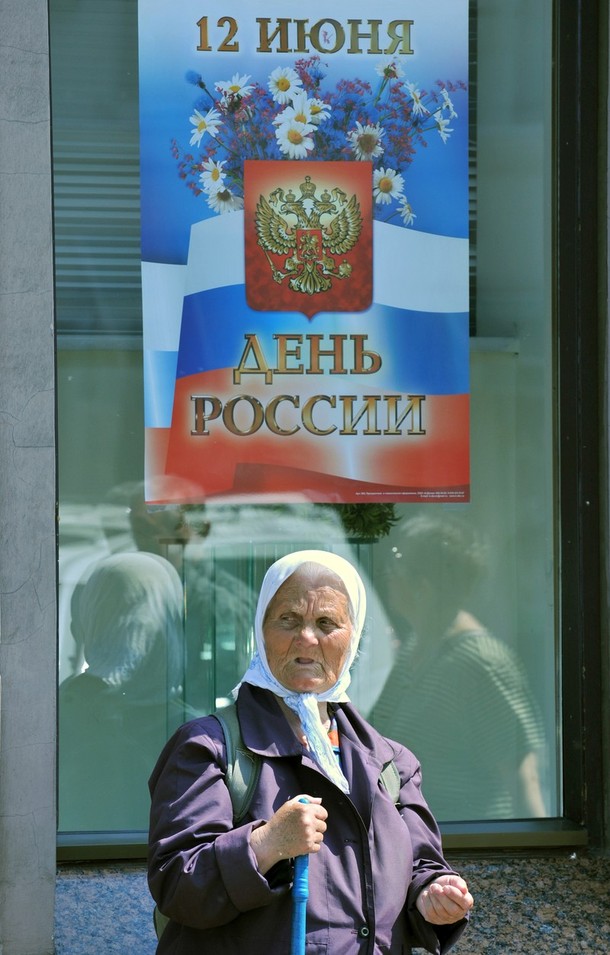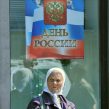
Russia Celebrates its National Day Facing an Uncertain Future
Publication: Eurasia Daily Monitor Volume: 6 Issue: 115
By:

Russia’s national day had all the necessary flags in the streets and a reception in the Kremlin, but few Russians see the point in celebrating the "Declaration on State Sovereignty" approved by the Congress of People’s Deputies on June 12, 1990. That act delivered a major blow to the crumbling USSR and opened the prospect of liberation from the all-penetrating control of the despised Soviet nomenklatura, but the joy of gaining freedom is long gone, while nostalgia about lost stability and ambitions to restore Russia’s "greatness" go hand in hand (www.grani.ru, Ezhednevny Zhurnal, June 12). Disappointed illusions have been replaced with opportunism and consumerism, so Yevgeny Yasin, the doyen of Russian liberal economists, admits: "We are a European nation without its values, and it is not clear how to get out of this trap" (New York Times, May 18).
Much like the Soviet Union in its autumnal months, Russia is now sinking into a devastating economic crisis, which generates discontent in the elites and awakens the dispossessed from their habitual passivity. The latest official forecast for the gross domestic product (GDP) decline in 2009 is 9.8 percent, but government "optimists," such as Deputy Prime Minister Igor Shuvalov, insist that the worst phase is already over, since "the situation develops in a positive direction" (www.newsru.com, June 11). The stock exchange is indeed optimistic as the oil price climbs back to the level of $70 per barrel, but this does not help the sharp contraction of industry, and the many regions facing a wave of desperate public protests. President Dmitry Medvedev demanded that governors take personal responsibility for curbing unemployment, but their administrative resources are often insufficient to make the owners of enterprises that have stopped production to pay salaries to their idle workers (Vedomosti, 11 June). The official media adds more pressure on the regional leaders who dare to criticize the "manual control" from the federal center, like Bashkortostan’s president Murtaza Rakhimov, who has built a corrupt family business in his fiefdom (Rossiyskaya Gazeta, June 11).
This tactic of scapegoating the regional leaders might work for the duration of summer (when dachas provide useful distractions for many Russians) but already it is failing in the North Caucasus. Much like in the mid-2000’s, or indeed in the early 1990’s, this region is becoming engulfed by violent instability, and the assassination of Adilgirei Magomedtagirov, Dagestan’s long-serving interior minister, has made this trend too risky to ignore for the federal center. Medvedev held a special meeting of the Security Council in Makhachkala, Dagestan and demanded greater effort at eliminating "terrorist scum," focusing not on external connections but on "massive, horrifyingly widespread corruption" (Vremya Novostei, June 10). The problem is that Moscow has facilitated the growth of corrupt patronage networks by pouring federal funds into the promotion of stability in the North Caucasus, and now that the flow of money has started to dry out, the issues of "tribalism, crony relationships, thievery, and widespread bribery" (as listed by Medvedev) transmogrify into security threats. It is unlikely that the large-scale military exercises "Caucasus-2009" that are due to start on June 29 will deter the escalation of gang wars and terrorism, since the main target for the top brass is definitely Georgia (www.lenta.ru, June 11).
Each micro-conflict increases the tension in the awkward power-sharing arrangement between Medvedev and Putin, and any failing governor seeks to hide in the gap between the two. No visible conflict has emerged so far in the duumvirate, but in the hermetically closed mechanism of decision-making, the first conflict that becomes visible will signify the terminal failure of the system. What is apparent in recent weeks is Medvedev’s consistent effort at increasing the flexibility of bureaucratic structures or, as he said at the Kremlin ceremony, "creating more space for freedom, creativity and competition." It may amount only to a superficial "liberalization" of the Kremlin’s facade, but he had a meeting last week with the leaders of parties that are not represented in the Duma -and listened patiently to the arguments that the over-bloated "vertical" of power was the main obstacle for modernization (www.gazeta.ru, June 11). Putin will have none of this "radicalism" and prefers to make a dignified visit to the graves of such "patriots" as General Anton Denikin, or an appearance at the studio of artist Ilya Glazunov, who takes to heart his instructions on which heroes in Russian history deserve a place in his paintings (Moscow Echo, June 12).
What is also visible is Putin’s increasing propensity to emphasize his seniority in the duumvirate, and last week he made two major incursions into foreign policy, which in principle is a presidential domain. First the proposition that Russia could get rid of its nuclear arsenal if other states agreed to do likewise, which he ventured to Germany’s Foreign Minister Frank-Walter Steinmeier (Rossiyskaya Gazeta, June 11). It might amount only to a figure of speech, but the decision on joining the World Trade Organization (WTO) together with Belarus and Kazakhstan in one newly-formed Custom Union is certainly an unexpected turnaround (Kommersant, June 10). It signifies the withdrawal from negotiations that had lasted 16 years and appeared tantalizingly close to completion, while now each member of the WTO will have to grant consent to the unprecedented collective entry.
Medvedev will be able to reclaim the primacy in foreign policy matters at the summit of the Shanghai Cooperation Organization in Yekaterinburg June 15-16, and then use to maximum effect the later visit of U.S. President Barack Obama to Moscow. His presidency, however, is yet to establish that he is the "decider." Otherwise, all the talk about "stylistic revolution" by Gleb Pavlovsky and other "political-technologists" will remain speculative (Russkiy Zhurnal, June 3). Medvedev can continue to gloss over freedom only as long as the prosecution continues to read monotonously from the multiple volumes of the case against Mikhail Khodorkovsky and Platon Lebedev, in the always crowded courthouse in Moscow. The verdict will establish beyond any reasonable doubt whether Russia is able to escape from the Orwellian reality of "1984" described so vividly in the novel that appeared exactly 60 years ago.




